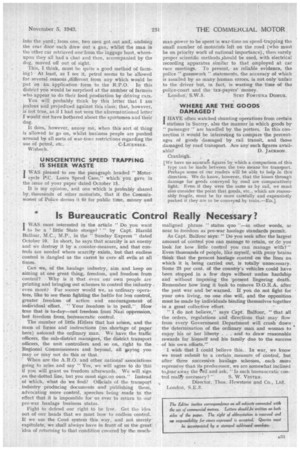• Is Bureaucratic Control Really Necessary?
Page 35

If you've noticed an error in this article please click here to report it so we can fix it.
WAS most interested in the article " Do you want
to be a little State stooge? ' " by Capt. Harold Balfour, MC., M.P., in the "Sunday Express" dated October 10. In short, he says that scarcity is an enemy and we destroy it by a counter-measure, and that controls are needed where scarcity exists, but that endless control is dangled as the carrot to cure all evils at all times.
Can we, of the haulage industry, aim and keep on aiming at one great thing, freedom, and freedom from control? Why is it that even our own people are printing and bringing out schemes to control the industry even more? Far sooner would we, as ordinary operators, like to see them fighting the battle for less control, greater freedom of action and encouragement of individual effort. "Your freedom is in peril." How true that is to-day—not freedom. from Nazi oppression, but freedom from, bureaucratic control.
The number of little Hitlers that has arisen, and the mass of forms and instructions (no shortage of paper here) astound the ordinary man. We have the traffic officers, the sub-district managers, the district transport officers, the unit controllers and so on, right to the Regional Commissioners and beyond, all flaying you may or may not do this or that.
When are the A.R.O. and other national associations going to arise and say " Yes, we will agree to do this if you will grant us freedom afterwards. We will sign on the dotted line, but you must sign. op ours." Instead of which, what do we find? Officials of the transport industry producing documents and publishing them, advocating more control, speeches being made to the effect that it is impossible for us ever to return to out pre-war haulage business status.
Fight to defend our right to be free. Get the idea out of our heads that we must bow to endless control. If we use the Coue system this way, and not merely capitulate, we shall always have in front of us the great idea of returning to that condition covered by the much
maligned phrase "status quo "—in other words, as near to freedom as pre-war haulage standards permit.
As Capt. Balfour says: "Do you seek after the largest amount of control you can manage to retain, or de you look for how little control you can manage with?" Even thousands of people, like myself, with puny brains think that the present haulage control on the lines on which it is being carried out, is totally unnecessary. Some 25 per cent. of the country's vehicles could have been stopped in a few days without undue hardship and without imposing the present lingering death. Remember how long it took to remove D.O.R.A. after the past war and be' warned. If you do not fight for your oWn living, no one else will, and the opposition must be made by individuals binding themselves together in a great collective effort.
" I do not believe," says Capt. Balfour, "that all the orders, regulations and directions that may flow from every Government Department will crush down the determination of the ordinary man and woman to enjoy his or her liberty . . . and to draw reasonable rewards for himself and his family due to the success of his own efforts."
I wish that I could believe this.. In war, we know we must submit to a certain m-.asure of control, but after three successive haulage schemes, each more repressive than its predecessor, we are somewhat inclined to tear away the /eil and ask, "Is such bureaucratic con trol realfy necessary?" S. W. VINTER.
Director, Thos. IIewstone and Co., Ltd. London, S.E.3.




















































